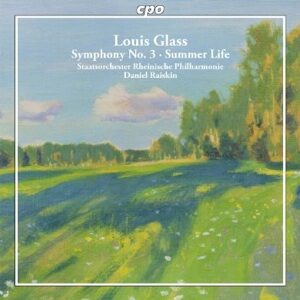Every decade or so some enterprising label takes Danish composer Louis Glass’s (1864-1936) symphonies out for a spin. Danacord tried it, and so did Marco Polo, but they haven’t caught on. Previously you might have argued that the problem was lackluster conducting, or engineering, or both, but now we have no excuse. Certainly this version of the Third, featuring the Staatsorchester Rheinische Philharmonie under the quite able Daniel Raiskin, is probably the best played, and certainly the best sounding, recording of a Louis Glass symphony that we have yet been offered. It doesn’t matter. Glass is a bore.
The symphony begins with a crib from the opening of Bruckner’s Fourth Symphony, and then meanders along the instrumental highways and byways of pastoral provincialism. The piece is a study in mellowness, with a first movement utterly lacking in tension, its folksy charm flavored now and again with a tasteful touch of chromatic spice. Glass uses traditional forms without betraying the slightest clue as to why they exist in the first place, and if you don’t know that then why bother? The symphonic medium simply serves as an excuse to string along a few pretty tunes (and they are pretty, really), with scant regard for the question of why they need to be gathered together and called “Symphony No. 3” in the first place.
The orchestral suite Summer Life is almost as large as the symphony, and a bit less dull thanks to the presence of bass drum and cymbals in the finale, used with almost embarrassing enthusiasm. Composed contemporaneously with the symphony and sounding much the same as regards thematic content, the work describes a typical summer’s day, and consists of typically conservative, amiable romantic noodling. You know the drill–rustic melodies given to the oboe, cute little bird chirps on the flute–we’ve heard it before a million times. It’s not bad, but hardly distinctive, although its relentlessly relaxed demeanor sounds more at home in this framework than it does in symphonic guise.
Listening to Glass, it’s easy to understand how Carl Nielsen’s explosive musical idiom blew away all of this namby-pamby wimpishness like a burst of fresh air and sunshine. Don’t get me wrong: Glass was not incompetent, just not terribly distinctive or imaginative, and historically speaking it’s interesting to hear how his rather tired idiom persisted in Danish music alongside more positive developments, generating understandable opposition to Nielsen’s far more potent musical brew. But historical and musical interest are two very different things; so don’t kid yourself about which one you’ll be getting in sampling this release.
































